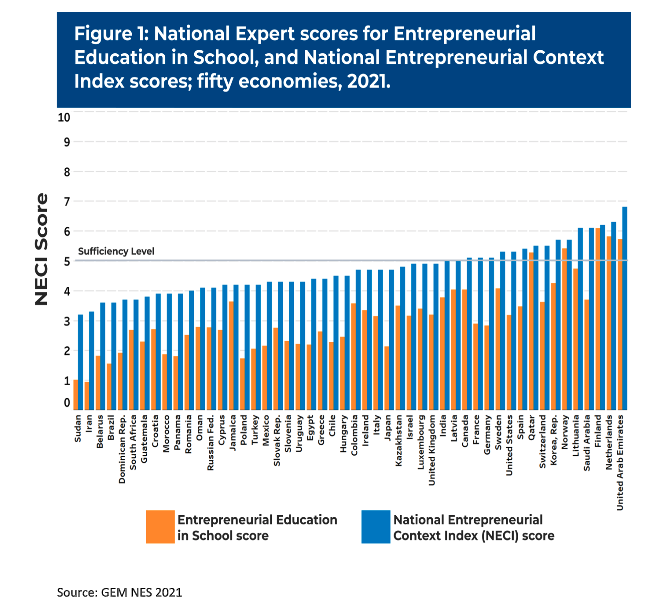The State of Global Entrepreneurship: With Great Disruption Comes Great Opportunity
Key Points
-
The Global Entrepreneurship Monitor has recently published their annual report.
-
The GEM survey shows that entrepreneurship programs are the exception, not the rule.

Applications to start new businesses hit a record 5.4 million in 2021, according to the US Census Bureau. While many decided to quit their old job and chase their dreams during the pandemic, millions more were displaced and launched entrepreneurial efforts to stay afloat.
Despite record startups, a new report suggests the US isn’t the best place in the world to start a business and it does a lousy job of educating young people on entrepreneurship.
The Global Entrepreneurship Monitor has recently published their annual report which shines a bright light on this divide between opportunity and disruption, inviting policymakers and leaders to think differently about entrepreneurship: where does entrepreneurship education, policy and infrastructure collide?
Lead Author of the GEM Report, Dr. Stephen Hill, shared “As I pored over the 2021 GEM Global results, one word kept coming to mind: resilience. When we had to stay home, we didn’t just hide beneath the covers: we baked bread and we made business plans […] If vaccines protect the health of nations, it is entrepreneurship that will protect the wealth of nations.”
This report features the collective assessments of over 2,000 national experts across 50 different economies. Among this larger survey, a smaller group of experts were asked to score 13 specific elements of that economy’s entrepreneurial ecosystem, labeled by GEM as Entrepreneurial Framework Conditions (EFCs), one of which is Entrepreneurial Education at School.
With the mounting scale of never before seen global challenges, we must empower young people with these skills for the good of our species and our planet.
Tom Vander Ark
These experts were asked a series of questions pertaining to the specific EFCs and the category of Entrepreneurial Education at School got the worst rating across the boards. The questions the experts were asked are the following: “In my country….(a) teaching in primary and secondary education encourages creativity, self-sufficiency, and personal initiative; (b) teaching in primary and secondary education provide adequate instruction in market economic principles, and (c) teaching in primary and secondary education provides adequate attention to entrepreneurship and new firm creation.”
The report found that a number of prosperous countries performed worse than to be expected, and oftentimes were surpassed by less developed countries. The survey makes it clear: “Improvements in entrepreneurship education in schools could be a relatively low-cost, high-impact means of enhancing the entrepreneurial environment.”

Schools are not placing an emphasis on embedding entrepreneurial skills and mindset in their students. With the mounting scale of never before seen global challenges, we must empower young people with these skills for the good of our species and our planet.
Another key element of the report was the need for supporting businesses owned by women and people of color. Entrepreneurship policy and education create great opportunities for designing communities with equity at the center.
Over the last few years, we’ve seen great examples of what entrepreneurship education can look like through programs like STARTedUp, Uncharted Learning, Venture Lab, Doing Whatever it Takes, and Startland’s MECA Challenge.
The largest regional effort to incorporate entrepreneurial experiences into education is the Kauffman Foundation sponsored Real World Learning initiative in Kansas City with 75 participating high schools.
The Real World Learning entrepreneurial experiences may be business startups or focused on social impact. Similarly, More than 50 of America’s leading universities in the KEEN network are cultivating an entrepreneurial mindset–spotting opportunity and delivering value to a community.
The GEM survey shows that these programs are the exception, not the rule. It’s time for every young person to have access to entrepreneurship education. Our future depends on it.
This post was originally published on Forbes.





0 Comments
Leave a Comment
Your email address will not be published. All fields are required.